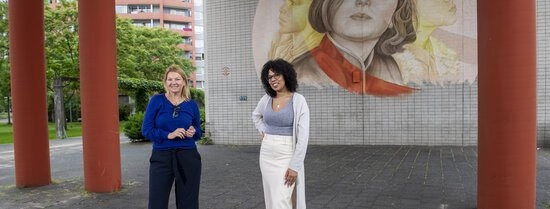Based in the SYNC Lab (Society, Youth and Neuroscience Connected), they do research relating to brain development in young people. When Professor Eveline Crone switched from Leiden to Rotterdam in 2020, Kayla Green came along in her wake for PhD research. Both see a wealth of opportunities in the city of Rotterdam. Kayla: "We want to do research close to the youth in the Netherlands. The full range of youth. Rotterdam, with all its diversity, is a perfect research location for us."
Eveline became a professor of Developmental Neuroscience in Society at ESSB in 2020. "At Erasmus University Rotterdam, I can really involve young people in the design of brain-related research. That's not happening anywhere yet; we are leading the way," says Eveline.
Adolescent well-being
Kayla studied Psychology and followed up her bachelor with the master Neuropsychology. Her PhD research focuses on well-being in adolescents and young adults. "During adolescence, a lot of things change. Physically, hormonally, but also in behaviour and brain development. We study the relationship between brain development and behaviour," says Kayla. "Mood swings and impulsive behaviour in young people often have a negative connotation. But it's part of the development. It's part of getting away from your parents," Kayla explains. "And that development is going well for the vast majority of young people. Only a small group experiences problems. Why is it that one person comes out of that period well, while the other doesn't 'land' so well in society? That research question is what we are trying to answer."
Start in Covid time
The approach chosen by Eveline Crone and her team is innovative. An approach that can perhaps best be summarised as “research with young people instead of researching them". Eveline: "Our Lab was started in Covid time. This, of course, created obstacles. But we focused on the opportunities. The past period was also a really challenging one for young people. We couldn't have wished for a better start! It is precisely in these times that we can be meaningful to young people. I am so proud of my team that we still got started based on this attitude!"
YoungXperts
That start involved the researchers involving young people in their work. They assess the questions that are asked: are these the right questions? Kayla: "Using brainstorming sessions and focus groups, we involve young people from the beginning, also because we believe it makes us better scientists. We hear from young people what's on their minds." The working method creates trust, is contagious and stands out. It opens doors. Recently, it has reached all the way into Prime Minister Rutte’s turret office, because that's what happens when you involve young people in research into well-being in Covid time. Together with colleagues, Kayla recently started the youth platform YoungXperts. Their Instagram channel features short facts about and for young people. "We want to feed back knowledge in an understandable way and like to see young people come up with their own ideas."
Social Equality
Kayla realises the importance of her work all too well: "I was raised by my single, hard-working mother. My grandparents brought me to school and picked me up in the afternoon. My mother would come home from work and we'd have dinner at grandma and grandpa's before going home again. Not everyone has a place as a child where you feel at home, where you can do your homework well and where you feel loved. I was lucky to have a family like that. And with my work, I may contribute a little to social equality. I think it's important for all children to find their way in society as best they can."
- Professor
- Researcher
- More information
This interview previously appeared in Spark magazine. This magazine is for students, alumni and partners of ESSB and showcases the positive impact that the faculty's education and research have on society.
Follow YoungXperts on Instagram via @young_xperts
Read more about Healthy Start, a new scientific initiative to break through the unequal starting position of children.

